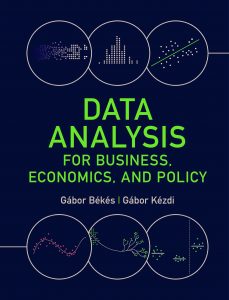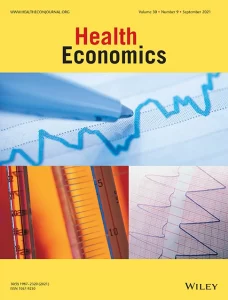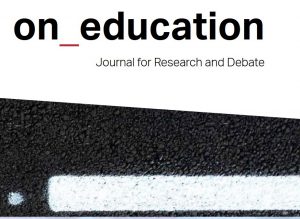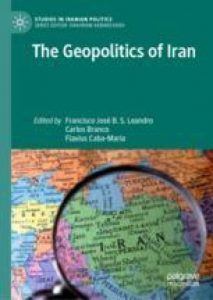Download in Pdf
Project updates
Overdue debts and financial exclusion
In Hungary’s most disadvantaged regions, even in prosperous times, many people lives in financial exclusion. Because of the debts that have grown to hopeless proportions, many have settled in not taking up declared work, not opening bank account, and therefore living with constant stress. However, non-performing loans are costly not only at individual level, but also at the level of society as a whole. The negative effect of overdue debts on health is almost as large as the positive effect of a high school diploma, according to an article published by Edina Berlinger, Katalin Dobránszky-Bartus and György Molnár (Institute of Economics, IE). Read more
Project: Higher Education Institutional Excellence Program 2020 of the Ministry of Innovation and Technology in the framework of the ‘Financial and Public Services’ research project (TKP2020-IKA-02) at Corvinus University of Budapest
 Brexit and power in the Council of the European Union
Brexit and power in the Council of the European Union
The exit of the United Kingdom from the European Union has had profound economic and political effects. László L. Kóczy (IE), in his recent study in Games looks at a particular aspect, the power distribution in the Council of the European Union. Using the Shapley–Shubik power index, he calculates the member states’ powers with and without the United Kingdom and update earlier power forecasts using the Eurostat’s latest population projections. There is a remarkably sharp relation between population size and the change in power: Brexit increases the largest members’ powers while decreasing the smallest ones’ powers. Read more
Project: National Research, Development and Innovation Office grant number K-128573, Higher Education Institutional Excellence Program 2020 of the Ministry of Innovation and Technology in the framework of the “Financial and Public Services” grant number TKP2020-IKA-02 at the Corvinus University of Budapest.
 Educational policies and the gender gap
Educational policies and the gender gap
Gender differences in educational achievement are a well-known phenomenon. In most countries, boys score higher in mathematics tests, while girls tend to do better in reading. However, gender differences vary greatly from country to country. While the literature attributes these differences mainly to cultural factors, Zoltán Herman (IE) and Marianna Kopasz examined whether this country-specific divergence may be related to local education policy characteristics. Their research focuses on three elements: early follow-up, human-centric teaching methods, and grade retention practices. The results published in Research Papers in Education suggest that the extent of the gender gap is indeed associated with certain characteristics of the various education systems. Read more
Project: Quality of teachers, carrier path of teachers, teacher-student matching: added value based analyses, Hungarian National Research Development and Innovation Fund and the European Union’s Horizon 2020 research and innovation programme, EdEN
 Organic solid waste management
Organic solid waste management
The international research team of REPAIR project published its findings on the level of organic waste management. They applied a sustainability framework to assess the organic fraction of municipal solid waste management in various EU cities (Ghent, Hamburg, Pécs) and they assessed solutions for the prevention, collection and treatment. Major conclusion of the reseach is that food waste prevention improves the performance of all the areas of protection. Read more
More on bioseasonal parking, reuse of empty glasshouses or educational composting onthe project’s website.
Project:REsource Management in Peri-urban AReas: Going Beyond Urban Metabolism (REPAiR) 2016 – 2020, EU Horizon 2020, Partners: TU Delft, Ghent University, University of Naples Federico II, HafenCity University, Institute of Geography and Spatial Organization PAS, Joint Research Centre, Geo-Col GIS and Collaborative Planning, Delta Development Group, BIOKOM Nonprofit Ltd, Gertz Gutsche Rümenapp Stadtentwicklung und Mobilität GbR, OVAM – Public Waste Agency of Flanders, Municipality of Haarlemmermeer, Campania Regional Authority, Pheno Horizon, Bauer Umwelt GmbH, Ivago, Stadtreinigung Hamburg
 Politics Without Meso-Level? No Politics at the Meso?
Politics Without Meso-Level? No Politics at the Meso?
The role of regions is dominantly shaped by vertical power relations. Within the multilevel system of governance, meso-level units are responsible not only for the management of public services and other economic development functions, but these are vital political actors with representative, integrative, mediatory and complementary missions. Recent paper of Ilona Pálné Kovács (Institute for Regional Studies, IRS) examines the role of meso-level governance in the Hungarian political system focusing on the county self-governments. The objective of the author is to introduce the consequences of the lack of meso-level politics for the backslide of the democratic system. Read more
Project: Governance challenges in peripheral regions, 2019-2022, Hungarian National Research Development and Innovation Fund
 Shrinking rural areas in Europe and in Hungary
Shrinking rural areas in Europe and in Hungary
The ESCAPE project aimed to identify how shrinking rural areas could be better served by a range of policies (Rural Development and Cohesion/regional Policy in particular) across the range of governance levels, from EU, through national, regional and local. In order to achieve this, the reasearch team analysed many facets and manifestations of population decline, and the complex ways in which these are tied into wider socio-economic processes as both causes and effects. The paper „European shrinking rural areas: key messages for a refreshed long-term European policy vision” co-authored by Katalin Kovács (IRS) and Gergely Tagai (IRS) summarizes the findings, paying particular attention to the conceptual framework, understanding the shrinking process, and underlying principles for intervention which need to be acknowledged in long-term vision for rural Europe. Katalin Kovács and Gergely Tagai shed light on population dynamics in Hungary in a separate paper giving more nuanced understanding by providing two case studies. Read more
Project: ESCAPE – European Shrinking Rural Areas: Challenges, Actions and Perspectives for Territorial Governance 2019-2020, ESPON Cooperation Programme (European Territorial Observation Network) Pertners: University of Eastern Finland – Karelian Institute (Joensuu), The James Hutton Institute – Social, Economic and Geographical Sciences Group (Aberdeen, University of Valencia – Institut de Desenvolupament Local (Valencia), Bundesanstalt fuer Bergbauernfragen (Vienna), Nordregio (Stockholm), Agriculture and Food Development Authority (Dublin)
Publication highlights
Békés Gábor, †Kézdi Gábor: Data analysis for business, economics, and policy. Cambridge : Cambridge University Press, 2021. 714 p.
 This textbook provides future data analysts with the tools, methods, and skills needed to answer data-focused, real-life questions; to carry out data analysis; and to visualize and interpret results to support better decisions in business, economics, and public policy. Data wrangling and exploration, regression analysis, machine learning, and causal analysis are comprehensively covered, as well as when, why, and how the methods work, and how they relate to each other. As the most effective way to communicate data analysis, running case studies play a central role in this textbook. Each case starts with an industry-relevant question and answers it by using real-world data and applying the tools and methods covered in the textbook. Learning is then consolidated by 360 practice questions and 120 data exercises. Extensive online resources, including raw and cleaned data and codes for all analysis in Stata, R, and Python, can be found at www.gabors-data-analysis.com. Read more
This textbook provides future data analysts with the tools, methods, and skills needed to answer data-focused, real-life questions; to carry out data analysis; and to visualize and interpret results to support better decisions in business, economics, and public policy. Data wrangling and exploration, regression analysis, machine learning, and causal analysis are comprehensively covered, as well as when, why, and how the methods work, and how they relate to each other. As the most effective way to communicate data analysis, running case studies play a central role in this textbook. Each case starts with an industry-relevant question and answers it by using real-world data and applying the tools and methods covered in the textbook. Learning is then consolidated by 360 practice questions and 120 data exercises. Extensive online resources, including raw and cleaned data and codes for all analysis in Stata, R, and Python, can be found at www.gabors-data-analysis.com. Read more
Braun Erik ; Sebestyén Tamás ; Kiss Tibor: The strength of domestic production networks: an economic application of the Finn cycling index. Applied Network Science, 6. 2021. Paper 69.
 There has been an increasing interest in analyzing the structure of domestic and global supply chains/networks in the past decade. Concerns about potential (systemic) risks resulting from overdependence on global supply networks have been magnified during the lockdowns triggered by the COVID-19 pandemic in the last year. Strengthening local and/or domestic networks may be an adequate approach to overcome the severe economic implications of this overdependence, but it also rises the question of how one can measure the strength of domestic supply/production networks and design an appropriate structure. The objective of this paper is to propose a method for measurement and to provide a first-cut analysis with this method on a sample of economies. Read more
There has been an increasing interest in analyzing the structure of domestic and global supply chains/networks in the past decade. Concerns about potential (systemic) risks resulting from overdependence on global supply networks have been magnified during the lockdowns triggered by the COVID-19 pandemic in the last year. Strengthening local and/or domestic networks may be an adequate approach to overcome the severe economic implications of this overdependence, but it also rises the question of how one can measure the strength of domestic supply/production networks and design an appropriate structure. The objective of this paper is to propose a method for measurement and to provide a first-cut analysis with this method on a sample of economies. Read more
Elek Péter, Bíró Anikó, Fadgyas‐Freyler Petra: Income gradient of pharmaceutical panic buying at the outbreak of the COVID‐19 pandemic. Health Economics Vol. 30. No. 9. 2021. pp. 2312-2320.
 We analyze the timing, magnitude, and income dependence of pharmaceutical panic buying around the outbreak of the COVID-19 pandemic in Hungary. We use district-level monthly and daily administrative data on detailed categories of pharmaceutical purchases, merge them to income statistics, and estimate multilevel panel models. Our main results are as follows. First, the days of therapy (DOT) of pharmaceutical purchases increased by more than 30% in March 2020, when major lockdown measures were announced. This pattern holds for almost all categories of pharmaceuticals. Second, shortly after the panic reactions, the aggregate amount of pharmaceutical purchases returned to their preshock levels; however, the frequency of pharmacy visits decreased. Third, the panic buying reaction was significantly stronger in richer geographical areas. Read more
We analyze the timing, magnitude, and income dependence of pharmaceutical panic buying around the outbreak of the COVID-19 pandemic in Hungary. We use district-level monthly and daily administrative data on detailed categories of pharmaceutical purchases, merge them to income statistics, and estimate multilevel panel models. Our main results are as follows. First, the days of therapy (DOT) of pharmaceutical purchases increased by more than 30% in March 2020, when major lockdown measures were announced. This pattern holds for almost all categories of pharmaceuticals. Second, shortly after the panic reactions, the aggregate amount of pharmaceutical purchases returned to their preshock levels; however, the frequency of pharmacy visits decreased. Third, the panic buying reaction was significantly stronger in richer geographical areas. Read more
Hajdu Tamás, Kertesi Gábor, †Kézdi Gábor: Ethnic segregation and inter-ethnic relationships in Hungarian schools. ON EDUCATION. JOURNAL FOR RESEARCH AND DEBATE Vol. 4. No. 11. 2021. pp. 1-6.
 We investigate the extent of the segregation of Roma students in the Hungarian primary school system and discuss its consequences for actual inter-ethnic relationships within schools. Drawing on results from our previous research, we show that more exposure to members of the other ethnic group (less segregation) leads to more inter-ethnic friendships but also to more inter-ethnic hostility. Importantly, we show that Roma students with above-average academic achievement experience a lot more inter-ethnic friendship relationships than hostility without losing friends from their own ethnic group, and thus the positive effects of more exposure to non-Roma peers far outweighs its negative effects. We conclude that policies that aim at improving the academic performance of Roma students can bring additional benefits by improving their relationships in school. Read more
We investigate the extent of the segregation of Roma students in the Hungarian primary school system and discuss its consequences for actual inter-ethnic relationships within schools. Drawing on results from our previous research, we show that more exposure to members of the other ethnic group (less segregation) leads to more inter-ethnic friendships but also to more inter-ethnic hostility. Importantly, we show that Roma students with above-average academic achievement experience a lot more inter-ethnic friendship relationships than hostility without losing friends from their own ethnic group, and thus the positive effects of more exposure to non-Roma peers far outweighs its negative effects. We conclude that policies that aim at improving the academic performance of Roma students can bring additional benefits by improving their relationships in school. Read more
Rózsa Erzsébet: Iran-India relations before and after the U.S. withdrawal from the Nuclear Deal and the consequent sanctions. In: Caba-Maria Flavius, Branco Carlos, Leandro Francisco José B. S. (eds.): The geopolitics of Iran. Singapore: Springer Singapore, 2021. pp. 531-552.
I ran-India relations ancient as they may be, their focus and scope are much more defined by contemporary interests, strategic perceptions, and a regional/global balance of power than historical or cultural connections. Consequently, bilateral relations fit into a wide-ranging regional as well as a global context, their complexity connecting and complementing the three levels of analysis. Present day bilateral relations per se are usually symbolized with energy (Iran’s oil and gas wealth vs India’s energy demand). The regional context is in fact a complex of their direct and/or their overlapping neighborhoods (the Persian Gulf, Pakistan, Afghanistan, the Indian Ocean, China) as well as Asia or even Eurasia (connectivity)—all presenting converging and/or overlapping interests and threat perceptions at the same time. While on the multilateral/global level the—in itself very complex—nuclear issue stands out (the dual-use nature of nuclear energy, nuclear non-proliferation, India’s military nuclear capability, Iran’s nuclear program). The chapter will analyze Iran-India relations on these levels and over these main topics. Read more
ran-India relations ancient as they may be, their focus and scope are much more defined by contemporary interests, strategic perceptions, and a regional/global balance of power than historical or cultural connections. Consequently, bilateral relations fit into a wide-ranging regional as well as a global context, their complexity connecting and complementing the three levels of analysis. Present day bilateral relations per se are usually symbolized with energy (Iran’s oil and gas wealth vs India’s energy demand). The regional context is in fact a complex of their direct and/or their overlapping neighborhoods (the Persian Gulf, Pakistan, Afghanistan, the Indian Ocean, China) as well as Asia or even Eurasia (connectivity)—all presenting converging and/or overlapping interests and threat perceptions at the same time. While on the multilateral/global level the—in itself very complex—nuclear issue stands out (the dual-use nature of nuclear energy, nuclear non-proliferation, India’s military nuclear capability, Iran’s nuclear program). The chapter will analyze Iran-India relations on these levels and over these main topics. Read more
More selected publications >>>
Conference presentation
 László Jóna (IRS): The Effect of the Pandemic of the Use of Public Spaces in Hungary
László Jóna (IRS): The Effect of the Pandemic of the Use of Public Spaces in Hungary
The first wave of the coronavirus epidemic in Hungary held in 2020 from March until April. During this period the restrictions not only to the shops opening hours came into force but also for the use of public spaces. The most settlements in Hungary had closed their public spaces and parks from the local population, thus preventing the mass spread of the epidemic. However the experiences have showed that most people against the restrictions has used in the same way actively the local public spaces as before. Therefore the research presents how the people has used the public spaces before and after the coronaviros epidemic in Hungary. And when will they use them again and how often after the pass of the epidemic. Besides that what they expect from the public spaces after the pass of the coronavirus epidemic. Read more
REAL CORP 2021: CITIES 20.50 Creating Habitats for the 3rd Millennium, 7-11 September, Vienna, Austria
Upcoming events
 October 15 10:00-11:00 CEST Miloš Resimić (Eötvös Loránd University & Transparency International): Network ties and the politics of renationalization in Serbia, ANET Lab Seminar Series
October 15 10:00-11:00 CEST Miloš Resimić (Eötvös Loránd University & Transparency International): Network ties and the politics of renationalization in Serbia, ANET Lab Seminar Series
November 4-5 Regional Economies in Change: Networks, Development and Resilience Special session of the XIX. Annual Meeting of the Hungarian Regional Science Association
November 29-30 SVOC2021, The Role of State in Varieties of Capitalism: The changing repertoire of state intervention to promote development in an unfolding new world order, organized by the Institute of World Economics CERS, Hungary and Democracy Institute of Central European University
December 9-10 Global Value Chains and Multinational Corporations – how do they relate? Joint hybrid workshop of Institute of World Economics, European Association of Development Research and Training Institutes (EADI) and Budapest Business School
Editor: Zsuzsa Balabán



